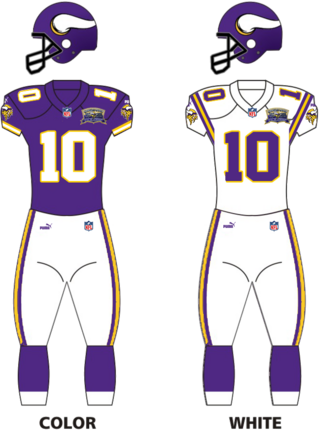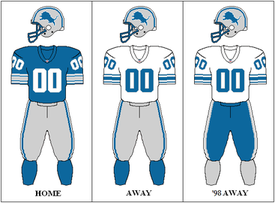The 2003 season was the Kansas City Chiefs' 34th in the National Football League (NFL), their 44th overall and their third under head coach Dick Vermeil.
The 1997 Chicago Bears season was their 78th regular season completed in the National Football League (NFL). The team finished with a 4–12 record under head coach Dave Wannstedt. It was the team's first 4-win season since they posted a 4–10 record in 1975. The team allowed a franchise-record 421 points in 1997.
The 1980 season was the Chicago Bears' 61st in the National Football League, and their third under head coach Neill Armstrong. The team failed to improve from their 10–6 record from 1979 to finish at 7–9, and failed to make the playoffs for the first time since 1978.
The 1994 season was the Green Bay Packers' 74th season in the National Football League (NFL), their 76th overall. The Packers finished with a 9–7 record for their third straight winning season. 1994 marked the first of 8 seasons in which Packers' quarterback Brett Favre would throw more than 30 touchdown passes. It also marked the second season in which he started all 16 games for the Packers, starting a record-breaking starting streak which would continue throughout his career. This was the final season that the Packers played at Milwaukee County Stadium; they played home games exclusively at Lambeau beginning in 1995. Three Packers had the distinction of being named to the NFL's All-Time 75th Anniversary Team: Reggie White, Don Hutson, and Ray Nitschke. After defeating the Detroit Lions 16–12 in the NFC Wild Card Game, the season ended in a 35–9 loss to the Dallas Cowboys in an NFC Divisional Playoff Game.

The 2000 season was the Minnesota Vikings' 40th in the National Football League (NFL). They won the NFC Central division title with an 11–5 record. After not retaining either Randall Cunningham or Jeff George, the team was led by first-year starting quarterback Daunte Culpepper and running back Robert Smith, who ran for a then team record 1,521 yards and seven touchdowns. The Vikings started out 7–0 and were 11–2 after 14 weeks, but slumped briefly, losing their last three to the St. Louis Rams, Green Bay Packers and Indianapolis Colts while Culpepper was hampered by injury.
The 1992 Dallas Cowboys season was the franchise's 33rd season in the National Football League (NFL) and was the fourth year of the franchise under head coach Jimmy Johnson. The Cowboys made the first of three Super Bowl appearances between 1992 and 1995.

The 1985 New York Jets season was the 26th season for the team and the 16th in the National Football League. It began with the team trying to improve upon its 7–9 record from 1984 under head coach Joe Walton. Among quarterbacks, Ken O'Brien had the lowest rate of interceptions, with only eight interceptions in 488 passing attempts. The Jets finished the season with a record of 11–5, qualifying for the top Wild Card spot in the playoffs. On October 14, during a Monday Night Halftime ceremony, the Jets retired Joe Namath's number 12, and helped inspire the Jets to a 23–7 victory over the Dolphins. In the Wild Card round of the playoffs, they fell at home to the eventual AFC champion New England Patriots 26–14.
The 1983 Pittsburgh Steelers season was the franchise's 51st season in the National Football League.
The 1992 season was the Green Bay Packers' 72nd season in the National Football League (NFL), their 74th overall. The team finished with a 9–7 record under new coach Mike Holmgren, earning them a second-place finish in the NFC Central division. 1992 saw the emergence of QB Brett Favre and the start of the Packers' success of the 1990s.
The 1991 Green Bay Packers season was their 73rd season overall and their 71st in the National Football League. The team finished with a 4–12 record under coach Lindy Infante, earning them fourth-place finish in the NFC Central division and costing Infante his job.

The 1987 Indianapolis Colts season was the 35th season for the team in the National Football League (NFL) and fourth in Indianapolis. It was also their first full season under head coach Ron Meyer, who had taken over an 0-13 Colts team the previous season after Rod Dowhower was fired.
The 1991 Detroit Lions season was the franchise's 62nd season in the National Football League, their 58th as the Detroit Lions. It stands as one of the team's best seasons since the NFL-AFL merger in 1970, and the first time when the Lions made it to the NFC Championship Game.
The 1995 Detroit Lions season was the team's 66th in the National Football League (NFL). Finishing at 10–6, it marked the Lions' third consecutive winning season, which had not been accomplished in Detroit since the team posted four consecutive winning seasons from 1969 to 1972.

The 2001 Detroit Lions season was the franchise's 72nd season in the National Football League (NFL). Marty Mornhinweg was named the 21st head coach in franchise history on January 21, 2001, after owner William Clay Ford Sr. controversially fired 2000 interim coach Gary Moeller.

The 1995 Jacksonville Jaguars season was the franchise's 1st season in the National Football League and the 1st under head coach Tom Coughlin. The Jaguars finished with a 4-12 record in their debut season and failed to qualify for the playoffs. However, they ended the season on a high note defeating the Cleveland Browns 24-21 on December 24 of that year.
The 1980 Detroit Lions season was the 51st season in franchise history. As the result of their 2–14 1979 season, the Lions were able to select Heisman Trophy-winning Oklahoma Sooner halfback Billy Sims with the first pick in the NFL draft. In his rookie season, Sims rushed his way to the Offensive Rookie of the Year Award while carrying the Lions back to respectability.
The 1984 Detroit Lions season was their 55th in the National Football League. The team failed to improve upon their previous season's output of 9–7, winning only four games. The team missed the playoffs for the first time in three seasons. Like the previous season, the Lions started 1–4, but unlike 1983, the Lions couldn't come back. In a season littered with numerous key injuries, the most painful was star running back Billy Sims suffering a career-ending knee injury in a game against the Minnesota Vikings. In just five seasons in the NFL since joining Detroit in 1980, Sims had set the Lions career rushing mark at 5,106.

The 2013 season was the Washington Redskins' 82nd in the National Football League (NFL). They failed to improve on their 10–6 regular season record from 2012, and suffered through a 3–13 season, which was the worst record that the team had posted since 1994, resulting in the firing of head coach Mike Shanahan and most of his staff after four seasons.
The 2014 Atlanta Falcons season was the franchise's 49th season in the National Football League (NFL) and the seventh and final under head coach Mike Smith. The Falcons were defeated by the Carolina Panthers in week 17, officially eliminating them from postseason contention for the second straight year. As a result, Smith was fired after his seventh year as head coach, after two straight years with a losing record.

The 2016 Green Bay Packers season was their 98th season overall, 96th season in the National Football League (NFL), and the 11th under head coach Mike McCarthy. Despite a 4–6 start to the season, the Green Bay Packers went on a 6-game winning streak to finish the regular season with a 10–6 record. The team clinched the NFC North for the fifth time in six years with their week 17 win over the Detroit Lions. They routed the fifth-seeded New York Giants 38–13 in the wild card round of the playoffs and defeated the top-seeded and heavily favored Dallas Cowboys 34–31 in the divisional round of the playoffs, but their season came to an end when they were beat by the second-seeded Atlanta Falcons in the NFC Championship Game 44–21.






